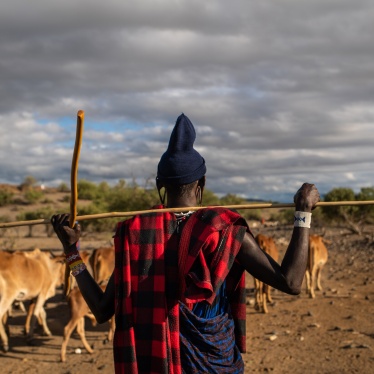(Paris) – Niger’s military authorities should immediately drop all charges and release a prominent civil society activist and critic of the government, who is detained solely for the peaceful exercise of his human rights, Amnesty International, Human Rights Watch, and the Observatory for the Protection of Human Rights Defenders (a joint programme of the World Organisation Against Torture and the International Federation for Human Rights, FIDH) said today.
The arrest and detention on December 3, 2024, of Moussa Tiangari, secretary general of the civil society organization Citizens’ Alternative Spaces (Alternatives Espaces Citoyens, AEC), in Niamey, Niger’s capital, appears linked to a pervasive crackdown by the Nigerien authorities’ on the political opposition, media, and peaceful dissent since Gen. Abdourahamane Tiani took power in a military coup in July 2023.
“Moussa Tiangari doesn’t belong in prison, and neither do several other Nigeriens unjustly arrested by General Tiani’s government, including former President Mohamed Bazoum and his wife,” said Drissa Traoré, secretary general of the FIDH. “Niger’s authorities should immediately release Tiangari, drop all the charges against him, and stop targeting human rights defenders and activists.”
At about 7:30 p.m. on December 3, at least three gunmen in plain clothes, who claimed to be policemen, arrested Tiangari, 55, at his home in Niamey, and seized his phone, laptop, and suitcase. “They violently broke into our home. My husband asked them if they had a warrant, but they replied that a warrant was not compulsory,” Tiangari's wife, who witnessed the arrest, said. “They ordered him [Tiangari] to follow them quietly as they did not want anybody to know what was going on.”
Tiangari had previously expressed concerns with his colleagues and friends about the risk of arbitrary arrest and detention looming over many Nigeriens, especially those publicly criticizing the military authorities, including himself.
“Tiangari told me that Nigerien civil society actors were worried, carefully weighting their words and actions to be able to continue defending human rights, despite the constant risk of arrest,” said Isidore Ngueuleu, head of the Africa unit at the World Organisation Against Torture. “Tiangari has been serving as a role model for many human rights defenders and his arrest is intended to intimidate them.”
For nearly two days, Tiangari’s whereabouts remained unknown. On December 5 at about 4 p.m., lawyers finally located him at the Central Service for Combating Terrorism and Organized Transnational Crime (Service Central de Lutte contre le Terrorisme et la Criminalité Transnationale Organisée, SCLCT/CTO) in Niamey and spoke to him. Rabiou Mamane, one of the lawyers representing Tiangari, said that his client was taken “hooded” to the office of the intelligence services, “which is not an investigative unit under the authority of the general prosecutor,” before being transferred to the SCLCT/CTO. Mamane said that Tiangari had been charged with “advocacy of terrorism, undermining state security and criminal association in connection with terrorism”.
“I had to fight to see my client and had to write several letters to judicial authorities denouncing the deplorable conditions in which Tiangari was arrested,” Mamane told Amnesty International. “I shouldn’t have had to do so, but there is no respect for the rule of law in Niger.”
Since the 1990s, Tiangari has been known as an activist working to advance human rights and the rule of law in Niger. He was first detained in May 2015 for four days, following an interview in which he expressed concerns about the arbitrary arrest of six people suspected of collusion with the armed Islamist group Boko Haram, and again in 2018 for participating in a peaceful protest.
Tiangari recently criticized the November 12 decision by Niger’s interior minister to withdraw the licenses of two humanitarian nongovernmental organizations, as well as the establishment on August 27 of a terrorism database.
On November 28, Alternatives Espaces Citoyens (AEC), Tiangari’s organization, convened a meeting to discuss the October 10 presidential decree provisionally removing Nigerien nationality from nine people linked to former President Bazoum. Human Rights Watch also raised concerns about the decree and called on the authorities to revoke it.
The charges against Tiangari, including advocating terrorism and criminal association in connection with terrorism, fall into the broad list of offenses that could lead to citizens being deprived of their citizenship even prior to conviction, according to the August order establishing the terrorism database.
Tiangari’s arrest has resulted in a public outcry. International, regional, and Nigerien human rights organizations, including Transparency International Niger, have called for his release.
Amnesty International, FIDH, Human Rights Watch, and the World Organisation Against Torture have extensively reported on the Nigerien authorities’ severe restrictions on the human rights of activists, journalists, opposition party members, and dissidents since the coup.
“Moussa Tiangari is the latest victim of the Nigerien government’s campaign to crush criticism of its policies and practices,” said Ilaria Allegrozzi, senior Sahel researcher at Human Rights Watch.
Authorities have arbitrarily detained former President Bazoum and his wife, and at least 30 officials from the ousted government, including former ministers, members of the presidential cabinet, and people close to the deposed president, denying them fair trial rights and due process of law. They have threatened, harassed, arbitrarily arrested journalists, suspended media organizations, and have rejected oversight of military spending, contrary to claims to combat corruption.
The African Charter on Human and Peoples’ Rights and the International Covenant on Civil and Political Rights, both of which Niger is a state party, protect the rights to freedom of opinion, expression, association, and peaceful assembly.
“All recent actions, including Tiangari’s arrest, show that Nigerien authorities should immediately release Tiangari and stop using terrorism-related charges to silence dissent,” said Samira Daoud, Regional Director for Amnesty International West and Central Africa. “Regional and international partners to Niger should condemn this targeting of those who speak truth to power.”







